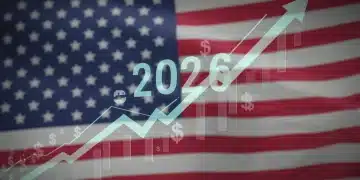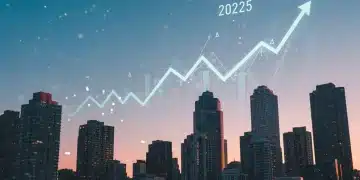They us economic trends: understanding their impact

Current economic trends significantly influence consumer behavior, driven by factors such as technological advancements, sustainability demands, and market adaptability, requiring businesses to stay flexible and informed to thrive.
They us economic trends play a crucial role in shaping our financial decisions and lifestyle choices. Ever wondered how shifting markets impact your daily life? Let’s explore the fascinating world of economic trends together.
Defining economic trends and their significance
Understanding economic trends is essential for grasping how global shifts can impact our daily lives. These trends help us see patterns in the economy, allowing individuals and businesses to make informed decisions.
What Are Economic Trends?
Economic trends refer to the general direction in which an economy is moving. They can range from growth and expansion to recession and contraction. Observing these trends can provide insights into the economy’s health.
The Importance of Recognizing Trends
Identifying these patterns is crucial. They influence everything from job markets to consumer spending. For instance, during a recession, people tend to save more and spend less, affecting businesses drastically.
- Economic trends guide investments and financial planning.
- They affect government policies and regulations.
- Understanding these trends helps businesses adapt to market changes.
By staying informed about economic trends, we can better navigate financial decisions and recognize opportunities in fluctuating markets. Moreover, these trends serve as indicators of future changes, helping stakeholders prepare and respond effectively.
Ultimately, recognizing economic trends fosters a more resilient economy. It encourages proactive engagement from both consumers and businesses, leading to better outcomes for everyone involved.
Current economic trends affecting consumer behavior
Understanding current economic trends is vital, as they significantly influence consumer behavior. These trends can shift rapidly, and being aware of them can help consumers make informed choices.
Impact of Inflation
One major trend today is inflation. Rising prices make consumers rethink their spending habits. For example, people might opt for less expensive brands or cut back on luxury items. This shift can greatly affect retailers and manufacturers.
Growing Interest in Sustainability
Another important trend is the increasing demand for sustainable products. Many consumers now prioritize buying from brands that demonstrate environmental responsibility. This trend encourages businesses to adopt eco-friendly practices to meet customer expectations.
- Shoppers are more likely to pay extra for sustainable products.
- Brands focusing on sustainability have seen growth.
- Consumers want transparency in product sourcing.
Additionally, technology plays a crucial role in changing consumer behavior. More people are shopping online, influenced by convenience and accessibility. Social media also impacts purchasing decisions, as targeted ads can drive consumers to explore new products.
As the economy fluctuates, factors like job security and disposable income also shape how people shop. In uncertain times, consumers may save more and spend less, prioritizing essential items over luxuries.
Overall, staying informed about current economic trends helps consumers navigate their choices effectively, while businesses adapt to these shifting preferences.
How businesses adapt to economic changes

Businesses must be agile and ready to respond to economic changes. Adapting swiftly can mean the difference between success and failure in today’s competitive landscape.
Understanding Market Trends
To thrive, companies analyze current economic trends. They study shifts in consumer preferences, purchasing power, and emerging technologies to better align their strategies. For example, if more people are shopping online, businesses may revamp their e-commerce platforms.
Flexible Business Models
Flexible business models are key to adaptation. Companies might diversify their product lines or services to meet changing demands. This diversification can protect them against volatility in specific markets.
- Offering subscription-based services can enhance customer loyalty.
- Creating seasonal promotions can boost sales during peak times.
- Expanding to new markets can reduce risk.
Another approach businesses take is investing in technology. With the rise of data analytics, firms can better forecast trends and customer needs. This technology aids in making informed decisions that align with economic conditions.
Moreover, companies focus on maintaining a strong relationship with customers. Listening to feedback allows businesses to understand shifting sentiments and adjust their offerings accordingly. Engaging with customers through social media platforms helps to build trust and enhance brand loyalty.
As economic changes occur, effective communication within the organization is crucial. Employees must be aware of new strategies and directions to ensure smooth transitions.
The role of technology in shaping economic trends
Technology plays a vital role in shaping economic trends. It not only drives innovation but also affects how businesses operate and consumers engage with products.
Automation and Efficiency
One notable impact of technology is increased automation. Many businesses now use automated systems to streamline processes. This leads to higher efficiency and reduced costs, transforming operational strategies across various industries.
Data Analytics
Another important aspect is the use of data analytics. Companies leverage big data to understand consumer behavior and predict market trends. By analyzing purchasing patterns, businesses can tailor their services and marketing strategies to meet customer needs.
- Targeted advertising based on user preferences.
- Personalized shopping experiences enhancing customer satisfaction.
- Informed decision-making based on accurate market predictions.
Furthermore, technology fosters innovation in product development. Businesses can now create and test new products rapidly, responding to trends much faster than before. This responsiveness helps companies stay competitive and relevant.
Additionally, technology facilitates global communication and commerce. With the rise of e-commerce platforms, businesses can reach customers across the world. This global reach influences economic trends, pushing brands to adapt to diverse markets and cultural preferences.
In summary, the integration of technology into business operations not only shapes the current economic landscape but also sets the foundation for future trends, making it a crucial element in understanding the economy.
Future predictions: where are economic trends heading?
The future of economic trends is a topic of great interest and speculation. Analysts and experts continuously study various indicators to predict where the economy may be heading.
Shifts in Consumer Preferences
One key prediction is the ongoing shift in consumer preferences. As people become more environmentally conscious, demand for sustainable products is expected to rise. Businesses that adapt to this trend by offering greener options will likely succeed.
Technological Advancements
Technological advancements are set to transform economies further. The rise of automation and artificial intelligence will create new industries while phasing out some traditional jobs. This change will necessitate workforce training and education to prepare for emerging roles.
- Expansion of remote work opportunities.
- Increased reliance on digital marketplaces.
- Growth in health tech and telehealth services.
Additionally, as globalization continues, markets will become more interconnected. This can lead to increased competition but also greater collaboration across borders. Businesses that leverage international partnerships may find new opportunities for expansion.
Another aspect to consider is the impact of governmental policies on economic trends. Changes in regulations and tax policies can significantly influence business operations and consumer spending. Staying informed about these potential changes is crucial for strategic planning.
Overall, the future of economic trends hinges on how societies adapt to changing circumstances. Flexibility and innovation will be key factors in navigating the evolving landscape.
FAQ – Frequently Asked Questions about Economic Trends
How do economic trends impact consumer behavior?
Economic trends affect consumer preferences, spending habits, and overall decision-making, influencing how individuals shop and interact with brands.
What role does technology play in shaping economic trends?
Technology drives innovation, enhances efficiency, and allows businesses to analyze data, helping them adapt to market changes and consumer demands.
Why is sustainability becoming an important trend?
Sustainability is important as consumers increasingly prefer eco-friendly products, prompting businesses to adapt to meet these expectations and promote responsible practices.
How can businesses prepare for future economic changes?
Businesses can prepare by staying informed about market trends, embracing flexibility, and investing in technology and workforce training to adapt to new demands.





